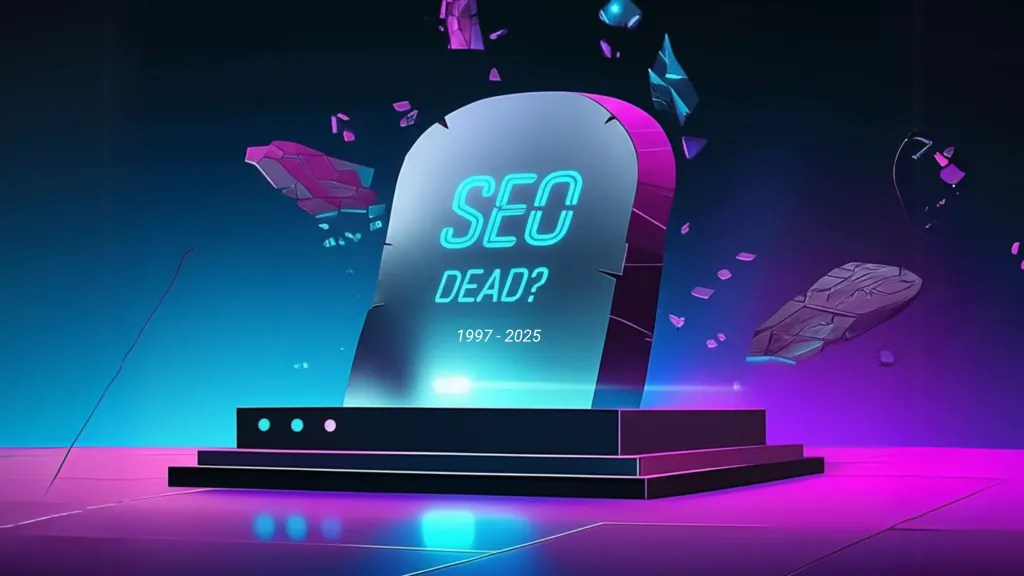Shock.. AI Kills SEO As The Whole World Watches

(forbes)
Google is trying to be more like Netflix, not Blockbuster. But is this simple pivoting destroying
the web? Or perhaps more accurately, putting traditional publishers in an untenable position
There’s been fairly robust coverage in the past few days of additional declines in conventional Google search — where you enter a string of keywords, and look through resulting search engine results pages (SERP) to find what you want.
There have been warnings about this for some time now — how in the mad rush to build AI tools, Google is threatening its own dominant business, the business of keyword search. But now, it seems like the phrase “Google apocalypse” has been freshly introduced, indicating a critical mass that will change the game for millions of users and businesses.
“Now that AI-generated summaries are being integrated into search results, anyone looking for information has less reason to click through to the websites where that information originates,” Klaudia Jaźwińska wrote in Columbia Journalism Review on Thursday, including estimates from Pew and other parties. “For media publishers whose business models rely on referral traffic to bring them advertising revenue, this shift feels nothing short of catastrophic.”
Other outlets have picked this up, too. There’s even a story from NPR, an institution that is, in its own way, in the hot seat. All of it is screaming the message that we will not be able to rely on time-tested methods in the new AI age.
The Big Picture
There are two ways to understand this sea change: you can look at the numbers, famously released by Pew and other parties, or you can try it for yourself. Go to Google, and put in a search phrase. You’ll see the AI overview come up at the top, in plain English. If you asked a question, that question gets answered “above the fold,” to use journalistic parlance. So why would you click into SERPs?
Not too long ago, I wrote about another aspect of this — the billion-dollar business of search engine optimization, or SEO, and how it is giving way to generative engine optimization, or GEO. Basically, since generative AI tools are killing keyword search, they’re also making that SEO work less relevant, which is devastating to businesses that have invested in things like keyword research.
That brings us to where this change is felt most deeply: the news media.
The Last Nail in the Coffin
Newspapers, magazines and community publications have been under pressure ever since the dot.com days of the early internet.
It started with the mandate to move to a digital payment model, which nobody liked. A newspaper was made to be in print. News offices had trouble figuring out how to maintain revenue with digital subscriptions.
Eventually, some of the top publications figured out SEO and related methods. They built the best digital payment systems they could. But blogging and alternative news sources made things tough.
Now, AI is writing stories, and newsrooms are cutting staff. Fewer consumers are choosing to invest in local news. And without even the ability to garner click-throughs, it’s anybody’s guess what kind of skeletal news system will remain.
I covered a Ted Talk by Boston Globe Reporter Jon Chesto, who laid out all of this in a revealing way. Combine the existing death of news media with a dramatic change in internet search architecture, and you have an apocalypse, indeed. The headline I used, “AI Lacks Full Capacity to Replace Journalism,” doesn’t mean that new changes won’t kill the institutions. It just means AI isn’t quite there yet.
Businesses are supposed to be able to pivot, to some extent. But they can’t pivot at the speed of light. And no one should expect them to. We’re having profound growing pains integrating powerful new technologies. It’s not just newsrooms. From your local furniture store to your neighbor’s landscaping business to a mid-level retailer, everyone has learned over the past 20-some years how to create an online footprint, one way or another, with Google search. It was already too monopolistic. But this rug pull could have drastic consequences. Stay tuned.














